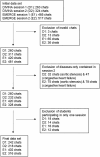Impact of providing a customized guideline on virtual medical history taking in two serious games for medical education
- PMID: 40635609
- PMCID: PMC12247099
- DOI: 10.1080/10872981.2025.2527175
Impact of providing a customized guideline on virtual medical history taking in two serious games for medical education
Abstract
Background: Serious games are known as safe learning environments, allowing medical students to train their skills without endangering patients' safety. By integrating virtual patients via chatbots, serious games provide the opportunity to practice history taking. The study investigated the impact of self-directed learning by means of a customized guideline on history taking in two distinct chatbot systems embedded in serious games.
Methods: Fourth-year medical students (N = 159) were randomized to one of two serious games, each representing an emergency department and simulating different clinical scenarios. Students played the serious games at two measurement points and received a guideline between both sessions. The chatbots differed in the manner of query entry, with one requiring students to formulate history taking questions themselves, while the other provided a long menu of selectable questions. The dependent variables analyzed included the history taking data entered into the chatbots, represented as a quantified history score, as well as students' comparative self-assessments of their learning outcomes.
Results: Comparing only the first measurement point, students achieved higher scores in the free-entry chatbot (85.2 ± 27.7) compared to the long menu chatbot (78.8 ± 35.7). Students achieved significantly higher scores in the second than in the first session in the long menu chatbot (t(315) = -2.918, p = .004, d = -0.229) but not in the free-entry chatbot after receiving the guideline. In terms of students' self-assessment, no significant difference between both serious games was found.
Discussion: The results suggest that history taking benefits from self-directed learning in a long menu format relying on cued recall but not in a free-entry chatbot relying on free recall. Since serious games are partially artificial learning environments for training history taking, future studies should examine the extent to which students can transfer their learning in and out of serious games.
Keywords: Chatbot; history taking; medical education; self-directed learning; serious game.
Conflict of interest statement
The author TR declares a financial conflict of interest as he holds shares in the company Yellowbird Consulting LTD that has developed the serious game DIVINA referred to in this article. No other author has competing interests.
Figures




References
Publication types
MeSH terms
LinkOut - more resources
Full Text Sources
Medical
